(英语)英语阅读理解(人物故事)题20套(带答案)
- 格式:doc
- 大小:116.50 KB
- 文档页数:17
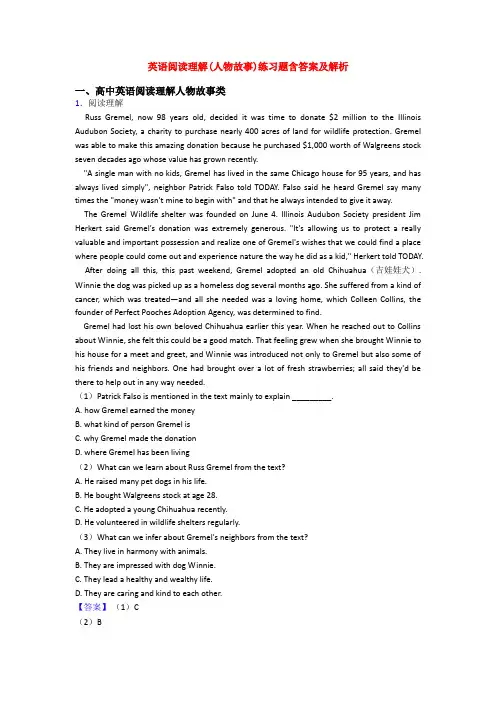
英语阅读理解(人物故事)练习题含答案及解析一、高中英语阅读理解人物故事类1.阅读理解Russ Gremel, now 98 years old, decided it was time to donate $2 million to the Illinois Audubon Society, a charity to purchase nearly 400 acres of land for wildlife protection. Gremel was able to make this amazing donation because he purchased $1,000 worth of Walgreens stock seven decades ago whose value has grown recently."A single man with no kids, Gremel has lived in the same Chicago house for 95 years, and has always lived simply", neighbor Patrick Falso told TODAY. Falso said he heard Gremel say many times the "money wasn't mine to begin with" and that he always intended to give it away.The Gremel Wildlife shelter was founded on June 4. Illinois Audubon Society president Jim Herkert said Gremel's donation was extremely generous. "It's allowing us to protect a really valuable and important possession and realize one of Gremel's wishes that we could find a place where people could come out and experience nature the way he did as a kid," Herkert told TODAY.After doing all this, this past weekend, Gremel adopted an old Chihuahua(吉娃娃犬). Winnie the dog was picked up as a homeless dog several months ago. She suffered from a kind of cancer, which was treated—and all she needed was a loving home, which Colleen Collins, the founder of Perfect Pooches Adoption Agency, was determined to find.Gremel had lost his own beloved Chihuahua earlier this year. When he reached out to Collins about Winnie, she felt this could be a good match. That feeling grew when she brought Winnie to his house for a meet and greet, and Winnie was introduced not only to Gremel but also some of his friends and neighbors. One had brought over a lot of fresh strawberries; all said they'd be there to help out in any way needed.(1)Patrick Falso is mentioned in the text mainly to explain _________.A. how Gremel earned the moneyB. what kind of person Gremel isC. why Gremel made the donationD. where Gremel has been living(2)What can we learn about Russ Gremel from the text?A. He raised many pet dogs in his life.B. He bought Walgreens stock at age 28.C. He adopted a young Chihuahua recently.D. He volunteered in wildlife shelters regularly.(3)What can we infer about Gremel's neighbors from the text?A. They live in harmony with animals.B. They are impressed with dog Winnie.C. They lead a healthy and wealthy life.D. They are caring and kind to each other.【答案】(1)C(2)B(3)D【解析】【分析】本文是一篇记叙文,格雷梅尔是一个没有孩子的单身男人,他在芝加哥同一所房子里住了95年,一直过着简朴的生活。
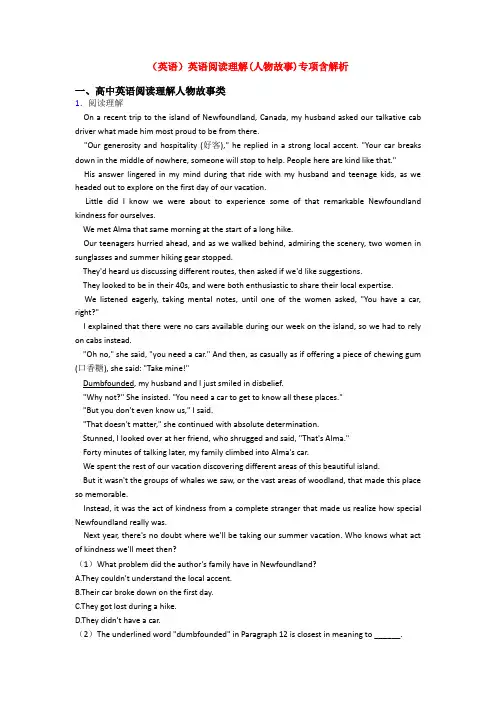
(英语)英语阅读理解(人物故事)专项含解析一、高中英语阅读理解人物故事类1.阅读理解On a recent trip to the island of Newfoundland, Canada, my husband asked our talkative cab driver what made him most proud to be from there."Our generosity and hospitality (好客)," he replied in a strong local accent. "Your car breaks down in the middle of nowhere, someone will stop to help. People here are kind like that."His answer lingered in my mind during that ride with my husband and teenage kids, as we headed out to explore on the first day of our vacation.Little did I know we were about to experience some of that remarkable Newfoundland kindness for ourselves.We met Alma that same morning at the start of a long hike.Our teenagers hurried ahead, and as we walked behind, admiring the scenery, two women in sunglasses and summer hiking gear stopped.They'd heard us discussing different routes, then asked if we'd like suggestions.They looked to be in their 40s, and were both enthusiastic to share their local expertise.We listened eagerly, taking mental notes, until one of the women asked, "You have a car, right?"I explained that there were no cars available during our week on the island, so we had to rely on cabs instead."Oh no," she said, "you need a car." And then, as casually as if offering a piece of chewing gum (口香糖), she said: "Take mine!"Dumbfounded, my husband and I just smiled in disbelief."Why not?" She insisted. "You need a car to get to know all these places.""But you don't even know us," I said."That doesn't matter," she continued with absolute determination.Stunned, I looked over at her friend, who shrugged and said, "That's Alma."Forty minutes of talking later, my family climbed into Alma's car.We spent the rest of our vacation discovering different areas of this beautiful island.But it wasn't the groups of whales we saw, or the vast areas of woodland, that made this place so memorable.Instead, it was the act of kindness from a complete stranger that made us realize how special Newfoundland really was.Next year, there's no doubt where we'll be taking our summer vacation. Who knows what act of kindness we'll meet then?(1)What problem did the author's family have in Newfoundland?A.They couldn't understand the local accent.B.Their car broke down on the first day.C.They got lost during a hike.D.They didn't have a car.(2)The underlined word "dumbfounded" in Paragraph 12 is closest in meaning to ______.A.shockedB.satisfiedC.relievedD.embarrassed(3)What impressed the author most during her stay in Newfoundland?A.The talkative cab driver.B.The whales swimming.C.The beautiful scenery of the island.D.The help from an enthusiastic stranger.(4)What can we infer about the author from the last paragraph?A.She is looking forward to meeting Alma once more.B.She expects to visit Newfoundland again.C.She hasn't decided where to go next year.D.She also wants to be kind to others during vacation.【答案】(1)D(2)A(3)D(4)B【解析】【分析】本文是一篇记叙文,作者最近一次去加拿大的纽芬兰旅行时,被当地人的热情好客深深触动。
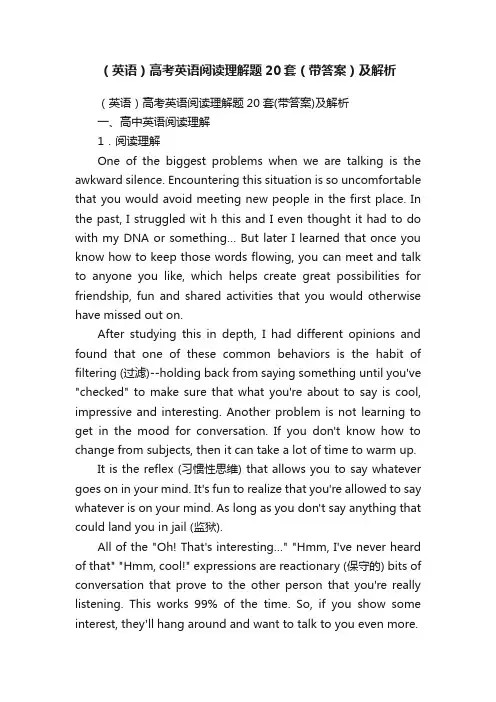
(英语)高考英语阅读理解题20套(带答案)及解析(英语)高考英语阅读理解题20套(带答案)及解析一、高中英语阅读理解1.阅读理解One of the biggest problems when we are talking is the awkward silence. Encountering this situation is so uncomfortable that you would avoid meeting new people in the first place. In the past, I struggled wit h this and I even thought it had to do with my DNA or something… But later I learned that once you know how to keep those words flowing, you can meet and talk to anyone you like, which helps create great possibilities for friendship, fun and shared activities that you would otherwise have missed out on.After studying this in depth, I had different opinions and found that one of these common behaviors is the habit of filtering (过滤)--holding back from saying something until you've "checked" to make sure that what you're about to say is cool, impressive and interesting. Another problem is not learning to get in the mood for conversation. If you don't know how to change from subjects, then it can take a lot of time to warm up.It is the reflex (习惯性思维) that allows you to say whatever goes on in your mind. It's fun to realize that you're allowed to say whatever is on your mind. As long as you don't say anything that could land you in jail (监狱).All of the "Oh! That's interesting…" "Hmm, I've never heard of that" "Hmm, cool!" expressions are reactionary (保守的) bits of conversation that prove to the other person that you're really listening. This works 99% of the time. So, if you show some interest, they'll hang around and want to talk to you even more.Everyone knows that stories juice-up conversations, but most people only talk about stories of their own lives. When someone mentions something related to any of them, just tell the story, even if it's not from your life. The more interesting, stranger or more frightening they are, the harder they are to forget.(1)If people can deal with the awkward silence, they can .A. train their working skillB. improve their life qualityC. enrich their social lifeD. establish their working relationship(2)When talking with others, we should .A. feel nervousB. think twiceC. be free to expressD. avoid breaking in (3)According to the passage, what do the speakers care much about?A. The attractive topics of conversation.B. The atmosphere of the conversation.C. The listener's experiences and tastes.D. The listener's curiosity and concern.(4)What does the underlined part "juice-up conversations" mean?A. making conversations more boringB. making conversations livelierC. making conversations smootherD. making conversations more relaxing【答案】(1)C(2)C(3)D(4)B【解析】【分析】本文本文是一篇议论文,我们谈话时最大的问题之一是尴尬的沉默。
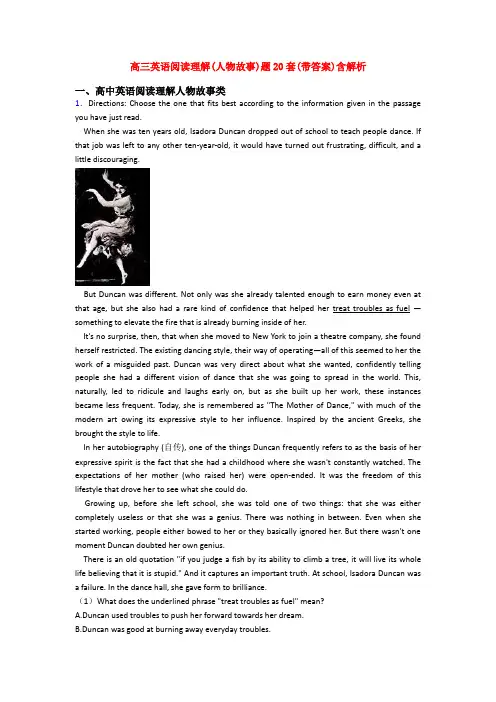
高三英语阅读理解(人物故事)题20套(带答案)含解析一、高中英语阅读理解人物故事类1.Directions: Choose the one that fits best according to the information given in the passage you have just read.When she was ten years old, Isadora Duncan dropped out of school to teach people dance. If that job was left to any other ten-year-old, it would have turned out frustrating, difficult, and a little discouraging.But Duncan was different. Not only was she already talented enough to earn money even at that age, but she also had a rare kind of confidence that helped her treat troubles as fuel —something to elevate the fire that is already burning inside of her.It's no surprise, then, that when she moved to New York to join a theatre company, she found herself restricted. The existing dancing style, their way of operating—all of this seemed to her the work of a misguided past. Duncan was very direct about what she wanted, confidently telling people she had a different vision of dance that she was going to spread in the world. This, naturally, led to ridicule and laughs early on, but as she built up her work, these instances became less frequent. Today, she is remembered as "The Mother of Dance," with much of the modern art owing its expressive style to her influence. Inspired by the ancient Greeks, she brought the style to life.In her autobiography (自传), one of the things Duncan frequently refers to as the basis of her expressive spirit is the fact that she had a childhood where she wasn't constantly watched. The expectations of her mother (who raised her) were open-ended. It was the freedom of this lifestyle that drove her to see what she could do.Growing up, before she left school, she was told one of two things: that she was either completely useless or that she was a genius. There was nothing in between. Even when she started working, people either bowed to her or they basically ignored her. But there wasn't one moment Duncan doubted her own genius.There is an old quotation "if you judge a fish by its ability to climb a tree, it will live its whole life believing that it is stupid." And it captures an important truth. At school, Isadora Duncan was a failure. In the dance hall, she gave form to brilliance.(1)What does the underlined phrase "treat troubles as fuel" mean?A.Duncan used troubles to push her forward towards her dream.B.Duncan was good at burning away everyday troubles.C.Troubles turned Duncan into a confident girl.D.Troubles lit the fire of dancing in Duncan.(2)Which of the following is TRUE about Duncan?A.Her experience in New York was the foundation of her career.B.Her teaching job when she was little destroyed her confidence.C.Her dancing style was not very well received at the beginning.D.Her mother set higher expectation on her than she could bear.(3)What does the author try to tell the readers in the last paragraph?A.It is useless climbing a tree to catch fish.B.Everybody is a genius in his own way.C.Miseries come from human stupidity.D.Teachers can impact students greatly.(4)What is this passage mainly about?A.Isadora Duncan's childhood and her achievements today.B.Duncan's career development and other dancers' opinions of her.C.Isadora Duncan's early experiences and the reasons for her success.D.Duncan's high status in the dancing world and her unique expressive style.【答案】(1)A(2)C(3)B(4)C【解析】【分析】本文是一篇记叙文,伊莎多拉·邓肯十岁时辍学去教别人跳舞,作者讲述了她的早期的经历以及其取得成功的原因。
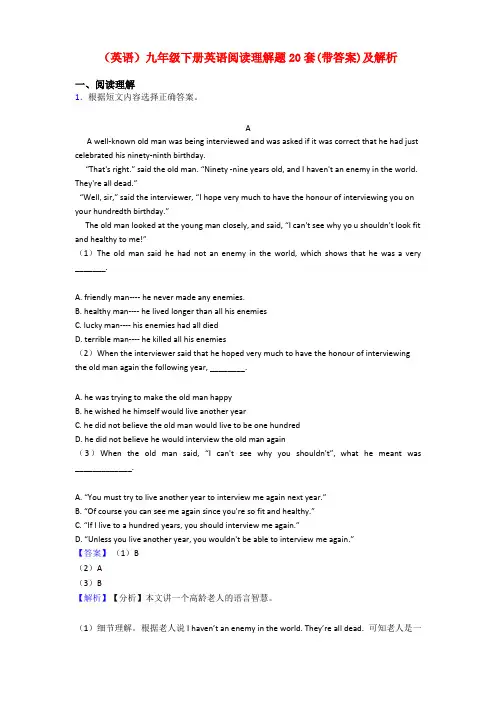
(英语)九年级下册英语阅读理解题20套(带答案)及解析一、阅读理解1.根据短文内容选择正确答案。
AA well-known old man was being interviewed and was asked if it was correct that he had just celebrated his ninety-ninth birthday.“That's right.” said the old man. “Ninety-nine years old, and I haven't an enemy in the world. They're all dead.”“Well, sir,” said the interviewer, “I hope very much to have the honour of interviewing you on your hundredth birthday.”The old man looked at the young man closely, and said, “I can't see why yo u shouldn't look fit and healthy to me!”(1)The old man said he had not an enemy in the world,which shows that he was a very _______.A. friendly man---- he never made any enemies.B. healthy man---- he lived longer than all his enemiesC. lucky man---- his enemies had all diedD. terrible man---- he killed all his enemies(2)When the interviewer said that he hoped very much to have the honour of interviewing the old man again the following year, ________.A. he was trying to make the old man happyB. he wished he himself would live another yearC. he did not believe the old man would live to be one hundredD. he did not believe he would interview the old man again(3)When the old man said,“I can't see why you shouldn't”,what he meant was _____________.A.“You must try to live another year to interview me again next year.”B.“Of course you can see me again since you're so fit and healthy.”C.“If I live to a hundred years, you should interview me again.”D.“Unless you live another year, you wouldn't be able to interview me again.”【答案】(1)B(2)A(3)B【解析】【分析】本文讲一个高龄老人的语言智慧。
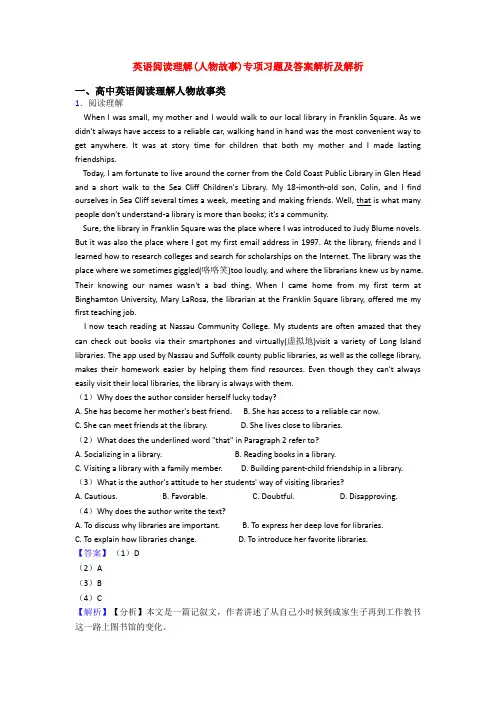
英语阅读理解(人物故事)专项习题及答案解析及解析一、高中英语阅读理解人物故事类1.阅读理解When I was small, my mother and I would walk to our local library in Franklin Square. As we didn't always have access to a reliable car, walking hand in hand was the most convenient way to get anywhere. It was at story time for children that both my mother and I made lasting friendships.Today, I am fortunate to live around the corner from the Cold Coast Public Library in Glen Head and a short walk to the Sea Cliff Children's Library. My 18-imonth-old son, Colin, and I find ourselves in Sea Cliff several times a week, meeting and making friends. Well, that is what many people don't understand-a library is more than books; it's a community.Sure, the library in Franklin Square was the place where I was introduced to Judy Blume novels. But it was also the place where I got my first email address in 1997. At the library, friends and I learned how to research colleges and search for scholarships on the Internet. The library was the place where we sometimes giggled(咯咯笑)too loudly, and where the librarians knew us by name. Their knowing our names wasn't a bad thing. When I came home from my first term at Binghamton University, Mary LaRosa, the librarian at the Franklin Square library, offered me my first teaching job.I now teach reading at Nassau Community College. My students are often amazed that they can check out books via their smartphones and virtually(虚拟地)visit a variety of Long Island libraries. The app used by Nassau and Suffolk county public libraries, as well as the college library, makes their homework easier by helping them find resources. Even though they can't always easily visit their local libraries, the library is always with them.(1)Why does the author consider herself lucky today?A. She has become her mother's best friend.B. She has access to a reliable car now.C. She can meet friends at the library.D. She lives close to libraries.(2)What does the underlined word "that" in Paragraph 2 refer to?A. Socializing in a library.B. Reading books in a library.C. Visiting a library with a family member.D. Building parent-child friendship in a library.(3)What is the author's attitude to her students' way of visiting libraries?A. Cautious.B. Favorable.C. Doubtful.D. Disapproving.(4)Why does the author write the text?A. To discuss why libraries are important.B. To express her deep love for libraries.C. To explain how libraries change.D. To introduce her favorite libraries.【答案】(1)D(2)A(3)B(4)C【解析】【分析】本文是一篇记叙文,作者讲述了从自己小时候到成家生子再到工作教书这一路上图书馆的变化。
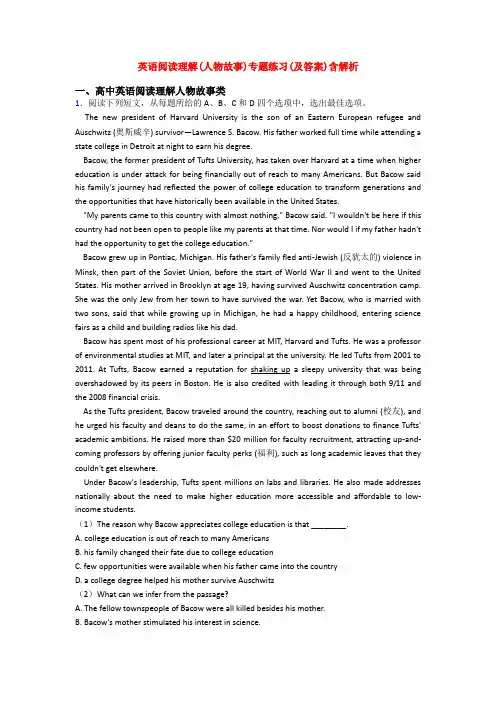
英语阅读理解(人物故事)专题练习(及答案)含解析一、高中英语阅读理解人物故事类1.阅读下列短文,从每题所给的A、B、C和D四个选项中,选出最佳选项。
The new president of Harvard University is the son of an Eastern European refugee and Auschwitz (奥斯威辛) survivor—Lawrence S. Bacow. His father worked full time while attending a state college in Detroit at night to earn his degree.Bacow, the former president of Tufts University, has taken over Harvard at a time when higher education is under attack for being financially out of reach to many Americans. But Bacow said his family's journey had reflected the power of college education to transform generations and the opportunities that have historically been available in the United States."My parents came to this country with almost nothing," Bacow said. "I wouldn't be here if this country had not been open to people like my parents at that time. Nor would I if my father hadn't had the opportunity to get the college education."Bacow grew up in Pontiac, Michigan. His father's family fled anti-Jewish (反犹太的) violence in Minsk, then part of the Soviet Union, before the start of World War II and went to the United States. His mother arrived in Brooklyn at age 19, having survived Auschwitz concentration camp. She was the only Jew from her town to have survived the war. Yet Bacow, who is married with two sons, said that while growing up in Michigan, he had a happy childhood, entering science fairs as a child and building radios like his dad.Bacow has spent most of his professional career at MIT, Harvard and Tufts. He was a professor of environmental studies at MIT, and later a principal at the university. He led Tufts from 2001 to 2011. At Tufts, Bacow earned a reputation for shaking up a sleepy university that was being overshadowed by its peers in Boston. He is also credited with leading it through both 9/11 and the 2008 financial crisis.As the Tufts president, Bacow traveled around the country, reaching out to alumni (校友), and he urged his faculty and deans to do the same, in an effort to boost donations to finance Tufts' academic ambitions. He raised more than $20 million for faculty recruitment, attracting up-and-coming professors by offering junior faculty perks (福利), such as long academic leaves that they couldn't get elsewhere.Under Bacow's leadership, Tufts spent millions on labs and libraries. He also made addresses nationally about the need to make higher education more accessible and affordable to low-income students.(1)The reason why Bacow appreciates college education is that ________.A. college education is out of reach to many AmericansB. his family changed their fate due to college educationC. few opportunities were available when his father came into the countryD. a college degree helped his mother survive Auschwitz(2)What can we infer from the passage?A. The fellow townspeople of Bacow were all killed besides his mother.B. Bacow's mother stimulated his interest in science.C. Bacow's father was good at working with electronics.D. Bacow's father came to the U.S. after World War II broke out.(3)The underlined word "shaking up" in paragraph 5 probably means ________.A. reactivatingB. causingC. damagingD. taking over(4)What is this passage mainly about?A. How to be admitted to Harvard University.B. The history of Bacow's family.C. The art of Bacow's leadership in Tufts.D. Bacow's way to individual success.【答案】(1)B(2)C(3)A(4)D【解析】【分析】本文是一篇名人传记,讲述了Bacow的个人成功之路。
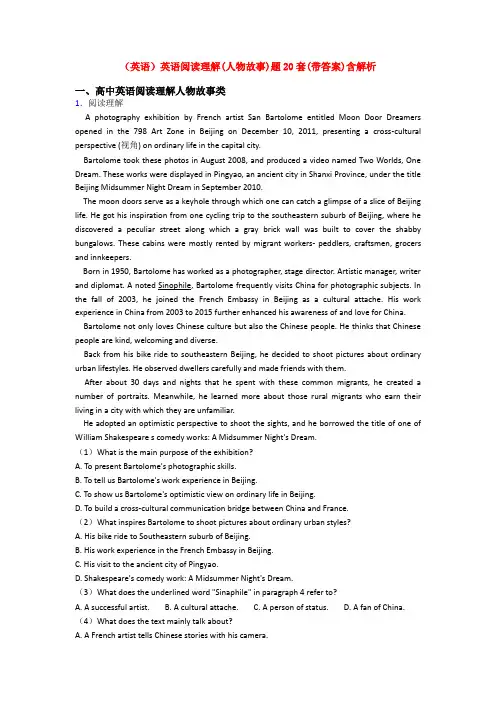
(英语)英语阅读理解(人物故事)题20套(带答案)含解析一、高中英语阅读理解人物故事类1.阅读理解A photography exhibition by French artist San Bartolome entitled Moon Door Dreamers opened in the 798 Art Zone in Beijing on December 10, 2011, presenting a cross-cultural perspective (视角) on ordinary life in the capital city.Bartolome took these photos in August 2008, and produced a video named Two Worlds, One Dream. These works were displayed in Pingyao, an ancient city in Shanxi Province, under the title Beijing Midsummer Night Dream in September 2010.The moon doors serve as a keyhole through which one can catch a glimpse of a slice of Beijing life. He got his inspiration from one cycling trip to the southeastern suburb of Beijing, where he discovered a peculiar street along which a gray brick wall was built to cover the shabby bungalows. These cabins were mostly rented by migrant workers- peddlers, craftsmen, grocers and innkeepers.Born in 1950, Bartolome has worked as a photographer, stage director. Artistic manager, writer and diplomat. A noted Sinophile, Bartolome frequently visits China for photographic subjects. In the fall of 2003, he joined the French Embassy in Beijing as a cultural attache. His work experience in China from 2003 to 2015 further enhanced his awareness of and love for China.Bartolome not only loves Chinese culture but also the Chinese people. He thinks that Chinese people are kind, welcoming and diverse.Back from his bike ride to southeastern Beijing, he decided to shoot pictures about ordinary urban lifestyles. He observed dwellers carefully and made friends with them.After about 30 days and nights that he spent with these common migrants, he created a number of portraits. Meanwhile, he learned more about those rural migrants who earn their living in a city with which they are unfamiliar.He adopted an optimistic perspective to shoot the sights, and he borrowed the title of one of William Shakespeare s comedy works: A Midsummer Night's Dream.(1)What is the main purpose of the exhibition?A. To present Bartolome's photographic skills.B. To tell us Bartolome's work experience in Beijing.C. To show us Bartolome's optimistic view on ordinary life in Beijing.D. To build a cross-cultural communication bridge between China and France.(2)What inspires Bartolome to shoot pictures about ordinary urban styles?A. His bike ride to Southeastern suburb of Beijing.B. His work experience in the French Embassy in Beijing.C. His visit to the ancient city of Pingyao.D. Shakespeare's comedy work: A Midsummer Night's Dream.(3)What does the underlined word "Sinaphile" in paragraph 4 refer to?A. A successful artist.B. A cultural attache.C. A person of status.D. A fan of China.(4)What does the text mainly talk about?A. A French artist tells Chinese stories with his camera.B. A French artist frequently visits China for photography.C. Migrant workers live a simple but happy life in Beijing.D. Moon Doors serve as a window to display China to the world.【答案】(1)C(2)A(3)D(4)A【解析】【分析】本文是一篇记叙文,法国艺术家圣巴托洛姆在北京798艺术区举办的名为"月亮之门梦想家"的摄影展,从跨文化角度呈现了普通城市的生活以及拍摄的原因。
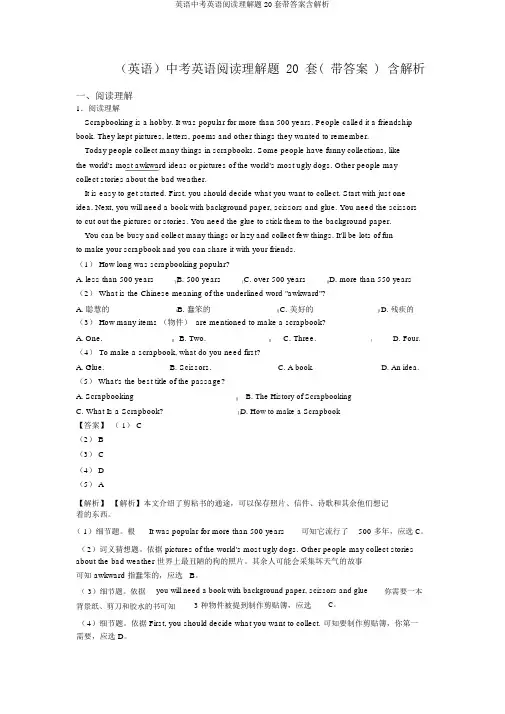
(英语)中考英语阅读理解题 20 套( 带答案 ) 含解析一、阅读理解1.阅读理解Scrapbooking is a hobby. It was popular for more than 500 years. People called it a friendship book. They kept pictures, letters, poems and other things they wanted to remember.Today people collect many things in scrapbooks. Some people have funny collections, likethe world's most awkward ideas or pictures of the world's most ugly dogs. Other people maycollect stories about the bad weather.It is easy to get started. First, you should decide what you want to collect. Start with just one idea. Next, you will need a book with background paper, scissors and glue. You need the scissors to cut out the pictures or stories. You need the glue to stick them to the background paper.You can be busy and collect many things or lazy and collect few things. It'll be lots of funto make your scrapbook and you can share it with your friends.(1) How long was scrapbooking popular?A. less than 500 yearsB. 500 yearsC. over 500 yearsD. more than 550 years (2) What is the Chinese meaning of the underlined word "awkward"?A. 聪慧的B. 蠢笨的C. 美好的D. 残疾的(3) How many items (物件) are mentioned to make a scrapbook?A. One.B. Two.C. Three.D. Four.(4) To make a scrapbook, what do you need first?D. An idea.A. Glue.B. Scissors.C. A book.(5) What's the best title of the passage?A. ScrapbookingB. The History of ScrapbookingC. What Is a Scrapbook?D. How to make a Scrapbook【答案】( 1) C(2) B(3) C(4) D(5) A【解析】【解析】本文介绍了剪粘书的通途,可以保存照片、信件、诗歌和其余他们想记着的东西。
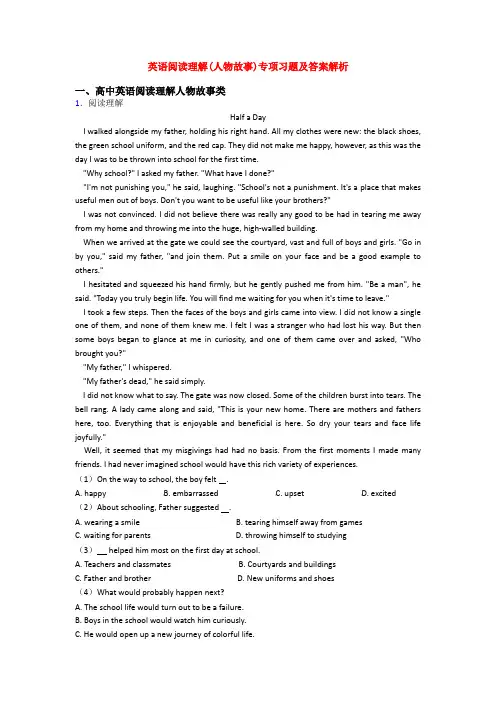
英语阅读理解(人物故事)专项习题及答案解析一、高中英语阅读理解人物故事类1.阅读理解Half a DayI walked alongside my father, holding his right hand. All my clothes were new: the black shoes, the green school uniform, and the red cap. They did not make me happy, however, as this was the day I was to be thrown into school for the first time."Why school?" I asked my father. "What have I done?""I'm not punishing you," he said, laughing. "School's not a punishment. It's a place that makes useful men out of boys. Don't you want to be useful like your brothers?"I was not convinced. I did not believe there was really any good to be had in tearing me away from my home and throwing me into the huge, high-walled building.When we arrived at the gate we could see the courtyard, vast and full of boys and girls. "Go in by you," said my father, "and join them. Put a smile on your face and be a good example to others."I hesitated and squeezed his hand firmly, but he gently pushed me from him. "Be a man", he said. "Today you truly begin life. You will find me waiting for you when it's time to leave."I took a few steps. Then the faces of the boys and girls came into view. I did not know a single one of them, and none of them knew me. I felt I was a stranger who had lost his way. But then some boys began to glance at me in curiosity, and one of them came over and asked, "Who brought you?""My father," I whispered."My father's dead," he said simply.I did not know what to say. The gate was now closed. Some of the children burst into tears. The bell rang. A lady came along and said, "This is your new home. There are mothers and fathers here, too. Everything that is enjoyable and beneficial is here. So dry your tears and face life joyfully."Well, it seemed that my misgivings had had no basis. From the first moments I made many friends. I had never imagined school would have this rich variety of experiences.(1)On the way to school, the boy felt .A. happyB. embarrassedC. upsetD. excited(2)About schooling, Father suggested .A. wearing a smileB. tearing himself away from gamesC. waiting for parentsD. throwing himself to studying(3) helped him most on the first day at school.A. Teachers and classmatesB. Courtyards and buildingsC. Father and brotherD. New uniforms and shoes(4)What would probably happen next?A. The school life would turn out to be a failure.B. Boys in the school would watch him curiously.C. He would open up a new journey of colorful life.D. His parents would accompany him at the school.【答案】(1)C(2)A(3)A(4)C【解析】【分析】本文是一篇记叙文,作者第一天去学校的时候并不开心,但是等他到了学校之后,他结交了很多朋友,开始了新的生活。
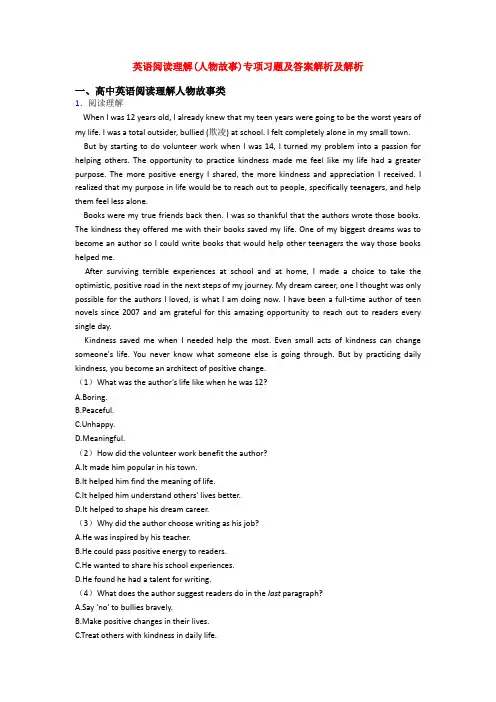
英语阅读理解(人物故事)专项习题及答案解析及解析一、高中英语阅读理解人物故事类1.阅读理解When I was 12 years old, I already knew that my teen years were going to be the worst years of my life. I was a total outsider, bullied (欺凌) at school. I felt completely alone in my small town.But by starting to do volunteer work when I was 14, I turned my problem into a passion for helping others. The opportunity to practice kindness made me feel like my life had a greater purpose. The more positive energy I shared, the more kindness and appreciation I received. I realized that my purpose in life would be to reach out to people, specifically teenagers, and help them feel less alone.Books were my true friends back then. I was so thankful that the authors wrote those books. The kindness they offered me with their books saved my life. One of my biggest dreams was to become an author so I could write books that would help other teenagers the way those books helped me.After surviving terrible experiences at school and at home, I made a choice to take the optimistic, positive road in the next steps of my journey. My dream career, one I thought was only possible for the authors I loved, is what I am doing now. I have been a full-time author of teen novels since 2007 and am grateful for this amazing opportunity to reach out to readers every single day.Kindness saved me when I needed help the most. Even small acts of kindness can change someone's life. You never know what someone else is going through. But by practicing daily kindness, you become an architect of positive change.(1)What was the author's life like when he was 12?A.Boring.B.Peaceful.C.Unhappy.D.Meaningful.(2)How did the volunteer work benefit the author?A.It made him popular in his town.B.It helped him find the meaning of life.C.It helped him understand others' lives better.D.It helped to shape his dream career.(3)Why did the author choose writing as his job?A.He was inspired by his teacher.B.He could pass positive energy to readers.C.He wanted to share his school experiences.D.He found he had a talent for writing.(4)What does the author suggest readers do in the last paragraph?A.Say 'no' to bullies bravely.B.Make positive changes in their lives.C.Treat others with kindness in daily life.D.Learn to care more about others' feelings.【答案】(1)C(2)B(3)B(4)C【解析】【分析】本文是一篇记叙文,作者讲述了自己参加志愿活动的经历,告诉人们:一次小善举也可能改变一个人的一生。
高考英语阅读理解(人物故事)专项训练及答案含解析一、高中英语阅读理解人物故事类1.阅读理解On March 25, 2010, Kate and David heard the words every parent dreads: Their newborn wasn't going to make it. Their twins-a girl and a boy-were born two minutes apart and 14 weeks premature, weighing just over two pounds each. Doctors had tried to save the boy for 20 minutes but saw no improvement. His heartbeat was nearly gone, and he'd stopped breathing. The baby had just moments to live."I saw him gasp (喘息), but the doctor said it was no use," Kate told the Daily Mail five years later. "I know it sounds stupid, but if he was still gasping, that was a sign of life. I wasn't going to give up easily."Still, the couple knew this was likely a goodbye. In an effort to cherish her last minutes with the tiny boy, Kate asked to hold him."I wanted to meet him, and for him to know us," Kate told Today. "We'd resigned ourselves to the fact that we were going to lose him, and we were just trying to make the most of those last, precious moments."Kate unwrapped the boy, whom the couple had already named Jamie, from his hospital blanket and asked David to take his shirt off and join them in bed. The first-time parents wanted their son to be as warm as possible and hoped the skin-to-skin contact would improve his condition. They also talked to him."We were trying to persuade him to stay," Kate told the Daily Mail. "We explained his name and that he had a twin that he had to look out for and how hard we had tried to have him." Then something miraculous happened. Jamie gasped again-and then he started breathing. Finally, he reached for his father's finger.The couple's lost boy had made it."We're the luckiest people in the world," David told Today.Eight years later, Jamie and his sister, Emily, are happy and healthy. The couple only recently told the kids the story of their birth. "Emily burst into tears," Kate said. "She was really upset, and she kept hugging Jamie. This whole experience makes you cherish them more."(1)What can we learn about the newborn babies?A. The boy's heart had stopped beating.B. The boy was 2 minutes older than the girl.C. The twins were born 14 weeks before the due date.D. The twins were expected to live for only 20 minutes.(2)When the couple knew they would lose the boy, they .A. begged the doctor to save himB. took his shirt off and then put him in bedC. wrapped him with his blanket to keep him warmD. talked to him and made close physical contact with him(3)What's the best title for the passage?A. The Power of Hug.B. The Miracle of Love.C. The Bond Between Twins.D. The Responsibility of Parents.【答案】(1)C(2)D(3)B【解析】【分析】本文是一篇记叙文,一对双胞胎出生时,医生告诉他们的父母男孩难以存活,只有几分钟的时间了。
(英语)英语阅读理解(人物故事)练习题含答案含解析一、高中英语阅读理解人物故事类1.阅读理解Jon Hoffman was sitting at a red light when he saw a man run out of a store carrying a plastic donation jar full of cash. The Plano, Texas, detective, dressed in plain clothes but wearing his badge (徽章) and gun, caught the man and pinned him to the hood of his car. But Hoffman had trouble containing the thief, and they got into a struggle."The detective has a martial arts background, and he said he thought the suspect must have a martial arts background, too, because he was able to break away so easily," a Plano police spokesperson said.The detective called out for help as a crowd gathered. Among those watching: Andre Harvey and Kirby Sample, two day laborers. Harvey did what has become common these days—he took out his phone and hit record. "I hate to say it, but I thought that this policeman was doing something illegal," Harvey said. "But when he asked for help, I thought, well, there won't be a shooting if I get over there in time.” Harvey j umped into action—while he was still recording the video—as did Sample."Harvey caught hold of the suspect's arms, while Kirby seized his legs, and they were able to get the suspect to the ground to help Detective Hoffman put the handcuffs (手铐) on," said the police spokesperson. The 27-year-old suspect was charged with resisting arrest and other offenses. The charity jar he stole held less than $ 50."I've been on the wrong side of the law several times in my life," Harvey told WFAA. "It feels good to be on the right side and do something positive."After the arrest, the three men got to know each other over steaks and ribs at a local steak house—Hoffman's treat, as a thank-you. But the rescuers say Hoffman deserves credit too. "It could have turned real ugly." Sample told the media "He handled himself like a real professional."(1)What made Hoffman call for help when arresting the suspect?A. He was not on duty.B. He needed witnesses to support him.C. He wanted to push the thief into the car.D. He couldn't control the suspect.(2)Why did Harvey and Kirby record the scene at the beginning?A. To follow the fashion.B. To keep track of the criminal.C. To record the detective's violence.D. To avoid being involved in the incident.(3)What can be inferred about Harvey?A. He was ready to violate the law.B. He might have had some illegal behaviour.C. He was out of work at that time.D. He had a good martial arts background.(4)What is Harvey and Sample's attitude towards Hoffman?A. Appreciative.B. Prejudiced.C. Skeptical.D. Cautious.【答案】(1)D(2)C(3)B(4)A【解析】【分析】本文是一篇记叙文,侦探Jon Hoffman在捉偷善款的小偷时遇到困难寻求帮助,Andre Harvey和 Kirby Sample帮助了他。
【英语】英语阅读理解(人物故事)专项习题及答案解析一、高中英语阅读理解人物故事类1.阅读理解The great-grandmother is learning English with the help of her family when she is at the age of 91. She hopes to use the language at next year's Olympic Games in Tokyo. Takamizawa was one of the more than 200, 00 people who requested to volunteer for Tokyo's 2020 Games. English is not required for service, but it is a useful skill for volunteers to have.But Takamizawa had not been able to learn the language when she was young. Takamizawa said that she was in high school when World War Two started. She said, "In my second year there, English was banned because it was the enemy language."Takamizawa said her grandchildren helped persuade her that she was not too old to learn. "When I talked to my grandchildren about my wish, they said, 'It's not too late. We will teach you one word a day' ". Natsuko is Takamizawa's granddaughter and main English teacher. Natsuko sends a new English word to her grandmother's phone every day. They also often work together directly on phrases that Takamizawa will need for the Olympics. "Welcome to Tokyo, this is the Olympic stadium, how can I help you?" Takamizawa answers when asked to say an English phrase she has learned. Natsuko explains that she wanted to give her grandmother something to enjoy. "I can clearly see her English is getting better. It's my joy now."The EF English Proficiency Index is a measure of the level of English spoken in a country. Japan ranks 49th among countries where English is not the first language. This situation is slowly changing as younger generations welcome English. However, Takamizawa believes real change will not happen unless Japanese people become more open to the rest of the world. With around 500 days to go until the games begin, the whole Takamizawa family is ready to welcome the world to Tokyo.(1)Why couldn't Takamizawa learn English when she was young?A. Because English was useless.B. Because she was too young to learn English.C. Because English was forbidden to learn.D. Because she was unwilling to learn English.(2)What can we know from the third paragraph?A. Takamizawa gets strong support from her family.B. Takamizawa's grandchildren love her a lot.C. Natsuko is Takamizawa's granddaughter and only English teacher.D. Natsuko teaches Takamizawa English mainly by talking with her.(3)What does the underlined phrase "This situation" in Paragraph 4 refer to?A. English is not the first language in Japan.B. The level of English spoken in Japan is relatively low.C. Younger generations in Japan welcome English.D. Japanese people become open to the rest of the world.(4)What is the main idea of the passage?A. Where there is a will, there is a way.B. It is never too late to learn.C. The early bird catches the worm.D. Two heads are better than one.【答案】(1)C(2)A(3)B(4)B【解析】【分析】本文是一篇记叙文,日本91岁的奶奶Takamizawa为了做好迎接在东京举行的2020奥运会的志愿工作,在孙辈的鼓励和帮助下开始学习英语。
【英语】高考英语阅读理解(人物故事)题20套(带答案)及解析一、高中英语阅读理解人物故事类1 •阅读理解Even if you've never been to Phoenix, you know this about the place It's hot. From June to September, the temperature can easily surpass the cen tury mark. But that does n't stop hikers from attempt ing the 1.3-mile hiki ng to the top of the city's famed Camelback Mountain. Sig ns warn that the trail is "extremely difficult". If you continue, a posted checklist suggests at least a liter of water per person. And if you're still not stopped, another sign farther up declares: "If you're halfway through your water, tur n around!"Unfortun ately, many people to not take the warnings seriously. Fortun ate y, Scott Cullymore does. The 53-year-old Cullymore can be found hiking up and down Camelback a couple of times a day, givi ng out cold bottles of water to worn-out hikers. He has helped hydrate so many hikers that he has earned a heave nly nickn ame: the Water An gel.Cullymore was on Camelback Mountain one day in 2015 when a British tourist died after being lost for n early six hours in the July heat. That experie nce in spired him to start help ing people caught un aware by the cruelty of Mother Nature. "They un derestimate the mountain, and they overestimate what they can do, and they get themselves in trouble." he warned.One hiker who was offered water agrees. "You think you know the heat, but the n you get out here in the desert and it surrounds you like a blanket," said Austin Hill, who was hiking with a high school friend. They were lucky, he said pointing to Cullymore. "We ran into this Good Samarita n here." And with that, the Water An gel goes in search of ano ther hiker in n eed.(1)What is the first paragraph mainly about?A. The risks in volved in the hik ing.B. The serious ness of the warnin gs.C. The distributio n of sig ns that warn hikers.D. The in flue nce of the temperature on hikers.(2)Why did some hikers on Camelback Mountain get in trouble?A. They were not well trained in hik ing.B. They forgot to take eno ugh water with them.C. They were too optimistic about the situati on.D. They were not fit eno ugh to hike the mountain.(3)What can we know about Austin Hill?A. He agreed to help others.B. He was saved by Cullymore.C. He hiked alone in the desert.D. He regretted tak ing a bla nket.(4)What is the best title for the text?A. The Camelback Moun ta inB. Survivi ng the HeatC. Hikers in NeedD. The Water An gel【答案】(1) A(2) C(3) B(4) D【解析】【分析】本文是一篇记叙文,远足者低估夏日的Camelback Mountain 同时高估自己的能力,所以在远足途中遇到麻烦,Cullymore 了解情况后决定帮助他们。
英语阅读理解题20套(带答案)及解析一、阅读理解1.阅读理解Science fiction is a popular kind of writing, and many people think of Jules Verne(凡尔纳) as the father of science fiction. He was born in France in 1828. His father wanted him to become a lawyer, but from his early 20s Verne decided to become a writer. At first he wrote plays for the theater. Then, in 1863, he wrote a story called Five Weeks in a Balloon. The success of this book encouraged him to write more stories such as A Journey to the Center of the Earth(1864) and From the Earth to the Moon(1865).In the 19th century, many people were interested in science and inventions. Jules Verne wrote about scientific subjects in his stories and, as a result, they were very popular. Verne's writing included many predictions(预言)for the 20th century and many of them came true. He described space flight, movies, and air conditioning, a long time before they appeared. These books were very successful and they made Verne rich.Jules Verne's books have been the subjects for many movies. 20, 000 Leagues under the Sea was a successful movie for Walt Disney. It was the first time that Disney movie had used real actors instead of cartoon drawings. Around the World in Eighty Days is another famous movie based on one of Verne's books. The main character is an Englishman called Phileas Fogg. For him, the most important thing is to be always on time!(1)What does the phrase "the father of science fiction" mean?A. The father who has several children.B. The man who loves science and inventions.C. The writer whose father wrote science fiction.D. The man who first started writing science fiction successfully.(2)What encouraged Jules Verne to write more stories?A. The plays he wrote for the theater.B. The encouragement from his father.C. The success of Five Weeks in a Balloon.D. The scientific subjects in his stories.(3)Why were Jules Verne's books very popular in the 19th century?A. Because his books made him rich and famous.B. Because he wrote many plays for the theater at that time.C. Because his books were the subjects for many movies.D. Because many people were interested in science and inventions.(4)Which of the following has the main character called Phileas Fogg?A. Five Weeks in a Balloon.B. Around the World in Eighty Days.C. A Journey to the Center of the Earth.D. From the Earth to the Moon.(5)According to the passage, which of the following is TRUE?A. The space flight Verne described was different from others.B. The main characters in Verne's books are always on time.C. Jules Verne only wrote in the 19th century.D. Many of the predictions in Verne's stories came true.【答案】(1)D(2)C(3)D(4)B(5)D【解析】【分析】文章大意:许多人认为朱勒凡尔纳是科幻小说之父,他的父亲希望他能成为一名律师,但是当他二十岁的时候,凡尔纳决定成为一名作家,他的书写的非常受欢迎,朱勒凡尔纳的书已经成为许多电影的主题。
【英语】高一英语阅读理解(人物故事)真题汇编(含答案)一、高中英语阅读理解人物故事类1.阅读理解Many people criticize today's newspapers as sensationalist, satisfying the public's abnormal curiosity. But journalism a century ago was just as notorious (臭名昭著). Publishers at that time routinely competed with each other for wild stories that could draw in the most readers. Meanwhile, it was an ideal atmosphere for a courageous reporter like Nellie Bly to spring into fame.Bly, whose name was Elizabeth Corcoran, had to work to make her way in the world. Different from many women of the time, however, she refused to let the working world scare her away. Her first big opportunity as a reporter came in 1885 after she wrote an angry letter denouncing the Pittsburgh Dispatch for an article it had run criticizing women forced to work outside the home. The interested and excited editor hired Bly for her "spirit," and soon she was investigating the situations of female factory workers. Bly cared less about their jobs than their lives after work - their amusements, their motivations, their fears and ambitions. She produced an article totally different from what other reporters of the time were writing: personal, thoughtful, meaningful.By 1887 Bly had a job with the New York World, one of the leader papers of the day. She quickly became famous for undercover stories about women in a mental hospital. Soon she had investigated life as a maid, a chorus girl, and even a street girl. In her best - known brave deeds, in 1890, Bly beat the famous "around the world in 80 days" trip Jules Verne had described in his novel. Traveling by steamship, train, even ricksha, Bly reported from each stop. A spellbound nation hung on every word. Only 25, Bly had become internationally famous.(1)Bly's first newspaper job was .A. with the New York WorldB. with the Pittsburgh DispatchC. to interview mental patientsD. to experience life of chorus girls(2)What does the underlined word "denouncing" in Para. 2 probably mean?A. Praising.B. Questioning.C. Informing.D. Condemning.(3)How did Nellie Bly gain world - wide fame?A. By criticizing Jules Verne.B. By competing with other reporters.C. By writing stories through investigation.D. By caring about women from different classes.(4)Which of the following best describes Nellie Bly?A. Daring and practical.B. Acute and confident.C. Critical and dependent.D. Calm and enthusiastic.【答案】(1)B(2)D(3)C(4)A【解析】【分析】本文是一篇记叙文,Bly是一名美国女记者,在那个记者都热衷于相互竞争而报道不实新闻特殊年代,她选择为女性说话。
(英语)英语阅读理解(人物故事)题20套(带答案)一、高中英语阅读理解人物故事类1.阅读理解I'm not much of a gardener. I love having beautiful flowers-but I don't have a good track record when it comes to making them grow.A few months after our son left for the Middle East, my friend gifted me a box of tulip bulbs (郁金香球茎). She explained that these bulbs were put into the ground in the fall and lay sleeping all winter. They had all the nutrients they needed inside the bulb and would come out in the spring. ''When you see the leaves of the tiny flowers pushing toward the sun, you'll know that it's almost time for your son to come home. They'll give you what you need most.'' She walked me through the process of planting them. I thanked her — trying to show my gratitude for her gift.It was a long winter — cold and dark. I endured both the weather and the loneliness and fear I felt with my son away. Dead leaves, frost and finally a heavy snow covered the area where I'd planted those flowers, and I soon forgot they were there.Finally the weather began to warm. One day, as I walked down my front steps, I noticed an area of green. I bent down to inspect the situation more clearly and saw that those tulips had begun to grow, their tiny leaves forcing their way to the sun.Day after day I noted the flowers' progress. And day after day, the time approached when my son would finally be home. Now with spring just around the corner, nothing could keep either of us from marching toward the light. Almost all of those bulbs bloomed. And with each brightly colored flower, I marked off one day closer to getting to hold my son in my arms again.(1)What can we know about the author?A.She is a professional gardener.B.She is not good at growing flowers.C.She never plants flowers at home.D.She often sends friends flowers as gifts.(2)Why did the writer forget the tulip bulbs soon?A.The bitter winter reminded her of her son far away.B.She was discouraged from making another attempt.C.They failed to live through the cold and long winter.D.She had no hope for beautiful flowers indeed.(3)What were those flowers mentioned in the last paragraph referred to?A.A physical representation of the hope.B.Things deep inside her heart and soul.C.A lesson she will never forget completely.D.The trouble she had in making them come out.(4)What can be a suitable title for the text?A.A dark winter with hope.B.Planting hope in winter.C.An area of green in spring.D.Living a changeable life.【答案】(1)B(2)D(3)A(4)B【解析】【分析】本文是一篇记叙文,作者的儿子去了中东,作者感到孤独和寂寞。
一位朋友送来了一盒郁金香球茎,这种花的种植,给作者带来了希望。
(1)考查细节理解。
根据第一段中的“I'm no t much of a gardener. I love having beautiful flowers-but I don't have a good track record when it comes to making them grow.”我不是个好园丁,我喜欢漂亮的花,但我在种植方面没有良好的记录,可知,作者虽然喜欢花,但不擅长种花。
故选B。
(2)考查推理判断。
根据第三段中的“It was a long winter —cold and dark …Dead leaves, frost and finally a heavy snow covered the area where I'd planted those flowers, and I soon forgot they were there.”那是一个漫长的冬天——又冷又黑……枯叶、霜和最后那场雪覆盖了我种那些花的地方,我很快救忘记了它们的存在,可知,冬天很冷、很长,故推测作者忘记它们是因为觉得它们熬不过这个冬天,即没对它们抱有希望。
故选D。
(3)考查细节理解。
根据最后一段中的“Day after day I noted th e flowers' progress. And day after day, the time approached when my son would finally be home. ”我日复一日的关注这花的成长。
一天又一天我的儿子终于要回家了;以及“And with each brightly colored flower, I marked off one day closer to getting to hold my son in my arms again. ”每开一朵色彩鲜艳的花,都标志着我离再次把儿子抱在怀里的日子又近了一天,可知,每开一朵花就代表作者儿子的归来近了一天,即花就是儿子回来的希望。
故选A。
(4)考查主旨大意。
根据第二段中的“She explained that these bulbs were put into the ground in the fall and lay sleeping all winter. They had all the nutrients they needed inside the bulb and would come out in the spring. ''When you see the leaves of the tiny flowers pushing toward the sun, you'll know that it's almost time for your son to come home. ”她说这些郁金香球茎秋天种下,整个冬天都在土里。
它们的球茎内有生长所需的营养物质,到了春天的就会从土里出来。
当你看到这些小花的叶子朝着太阳的方向生长时,你就知道你的儿子差不多该回家了,可知,本文主要讲述了冬天种下的郁金香球茎在春天会长出来,这也意味着作者的儿子快要回来,即花代表着作者儿子回来的希望。
B故选B。
【点评】本题考点涉及细节理解和主旨大意两个题型的考查,是一篇故事类阅读,考生需要准确掌握细节信息,同时根据上下文的逻辑关系,进行概括和归纳,从而选出正确答案。
2.阅读理解In the nineteenth century, one of America's greatest writers, Walt Whitman, helped people learn to value poetry. Whitman created a new kind of poetry.Walt Whitman was born in eighteen nineteen in New York City. During his long life, he watched America grow from a young nation to the strongest industrial power in the world. As a young man, Whitman worked as a school teacher, a printer and a newspaper reporter. He was thirty-sixyears old when he published his first book of poetry in eighteen fifty-five. He called it Leaves of Grass. It had only twelve poems. The poems are written in free verse. The lines do not follow any set form. Some lines are short. Some are long. The words at the end of each line do not have a similar sound. They do not rhyme.One of America's greatest thinkers and writers immediately recognized the importance of Leaves of Grass. Ralph Waldo Emerson praised Whitman's work. But most other poets and writers said nothing and even denounced it. Most readers also rejected Whitman's poems. The new form of his poetry surprised many people. Even his own brother told Whitman that he should stop writing poetry. But Whitman had many things to say. And he continued to say them. Readers began to understand that America had a great new poetic voice.Walt Whitman's poems praise the United States and its democracy. The poet expressed his love for America and its people in many ways. Experts today praise Leaves of Grass as a major literary work. In eighteen seventy-three, Walt Whitman suffered a stroke. He spent the last years of his life in Camden, New Jersey. Whitman was poor and weak during the last years of his life. He died in eighteen ninety-two. Some critics say Walt Whitman was a spokesman for democracy. Others say he was not a spokesman for anything. Instead, they simply call him a great poet.(1)What can we know about Whitman?A. His poems have the same rhyme.B. He is the first great poet in the USAC. He helped people to create new poems.D. His poems show his love for his country.(2)Why was Leaves of Grass refused at first?A. The poems are quite short.B. The form of poetry is special.C. Whitman wasn't famous then.D. There are only 12 poems in it.(3)What does the underlined word "denounced" in Paragraph 3 most probably mean?A. Accused.B. Downloaded.C. Published.D. Translated.(4)What can be a suitable title for the text?A. Walt Whitman—a Great SoldierB. Walt Whitman—an Unfortunate PoetC. Walt Whitman and Leaves of GrassD. The First and Greatest Poet in America【答案】(1)D(2)B(3)A(4)C【解析】【分析】本文是一篇人物介绍,介绍了美国著名的诗人Walt Whitman以及他的代表作《草叶集》。